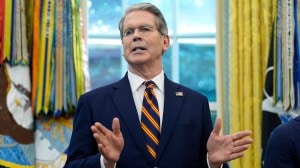China makes start of Hu Jintao era formal
Former president Jiang Zemin completed a historic leadership transition today when he handed over the chairmanship of the Party’s Centr...

Former president Jiang Zemin completed a historic leadership transition today when he handed over the chairmanship of the Party’s Central Military Commission to Communist Party chief Hu Jintao.
The party’s elite Central Committee accepted the resignation of Jiang, 78, on the final day of a four-day closed-door plenum and approved Hu’s rise to Chairman of the party’s decision-making Central Military Commission, Xinhua news agency said.
Hu, 61, who replaced Jiang as party chief in 2002 and as president in 2003, now holds the three most powerful positions in China, rounding off the first orderly succession in Chinese Communist history. ‘‘The Hu Jintao era has started,’’ a Chinese political analyst said on condition of anonymity.
In a sign that Jiang’s influence is already waning, his closest political ally, Vice President Zeng Qinghong, did not join the Military Commission. Xu Caihou, 61, a member of the Military Commission. Xu Caihou, 61, a member of the Military Commission, was promoted as a Vice-Chairman, Xinhua said.
Jiang’s departure is unlikely to result in dramatic changes in domestic, foreign and economic policies with Hu set to continue the market-friendly reforms that transformed China into the world’s seventh-largest economy.
The party ‘‘resolutely opposes and will contain ‘Taiwan independence’ splittist forces and unswervingly safeguard national sovereignty and territorial integrity’’, it said.
Sources with close ties to the party and Jiang’s family said he was in poor health and had had a heart problem since 1989.
‘‘Now that Hu takes over the top job, people will want to know how well he can strike a balance between easing China-Taiwan tensions, sustaining economic growth and maintaining China-US relations, particularly when there might be a new US President following November’s election,’’ said James Sung, principal lecturer at City University, Hong Kong.
In his resignation, Jiang said he had retired with hopes that his departure would standardise future generational changes. After the plenum, Jiang smiled and shook hands with Hu and other delegates to sustained applause and posed for a group photograph.
‘‘I hope that everyone will work hard and keep advancing under the leadership of the Party Central Committee with Comrade Hu Jintao as General Secretary,’’ Jiang said. ‘‘I’m convinced that our Party’s cause will witness more and bigger victories!’’
Hu credited Jiang for his ‘‘outstanding contribution to the Party, the state and the people’’ and thanked him for his ‘‘support and assistance’’ to party leaders.
Jiang had not been due to retire as Military Chief until 2007 but came under pressure to emulate the late paramount leader Deng Xiaoping, who stepped down from the top military job two years after quitting the all-powerful Politburo Standing Committee but wielded enormous clout behind the scenes for years.
His departure would defuse budding tensions with Hu and thus head off the sort of power struggle that has resulted in abrupt policy shifts since the 1949 communist takeover and toppled more than one heir-apparent.
— Reuters
Photos



- 01
- 02
- 03
- 04
- 05




























